Global End Point Security Market is estimated to be worth USD 14.2 Billion in 2022 and is projected to grow at a CAGR of 6.5% between 2023 to 2032. The study has considered the base year as 2022, which estimates the market size of market and the forecast period is 2023 to 2032. The report analyzes and forecasts the market size, in terms of value (USD Billion), for the market. The report segments the market and forecasts it by component, by deployment, by organization, by application and region/country.
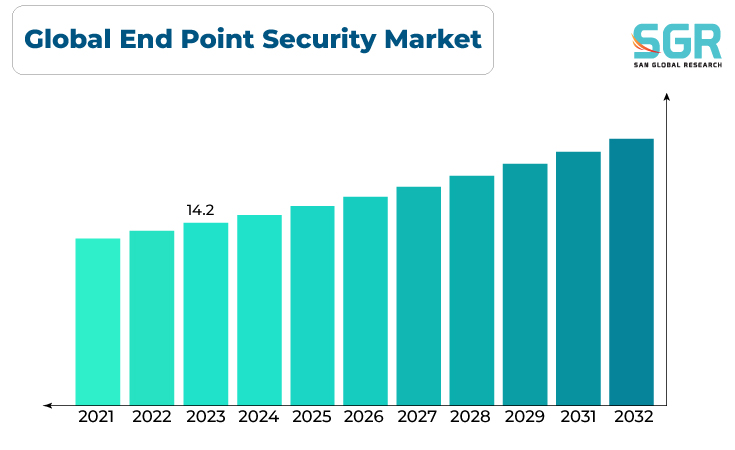
The global endpoint security market encompasses a range of solutions and strategies designed to safeguard network endpoints such as computers, laptops, mobile devices, and servers from cyber threats. Endpoint security has become increasingly crucial as organizations face a growing number of sophisticated cyberattacks targeting endpoints, aiming to gain unauthorized access, steal data, or disrupt operations. These security solutions include antivirus software, firewalls, intrusion detection systems, encryption tools, and advanced endpoint protection platforms. The market is driven by rising cybersecurity concerns, stringent regulatory compliance requirements, and the proliferation of remote work, leading to increased vulnerability of endpoints. Additionally, the continuous evolution of cyber threats prompts organizations to invest in robust endpoint security solutions to mitigate risks and ensure comprehensive protection against malware, ransom ware, phishing, and other cyber threats.
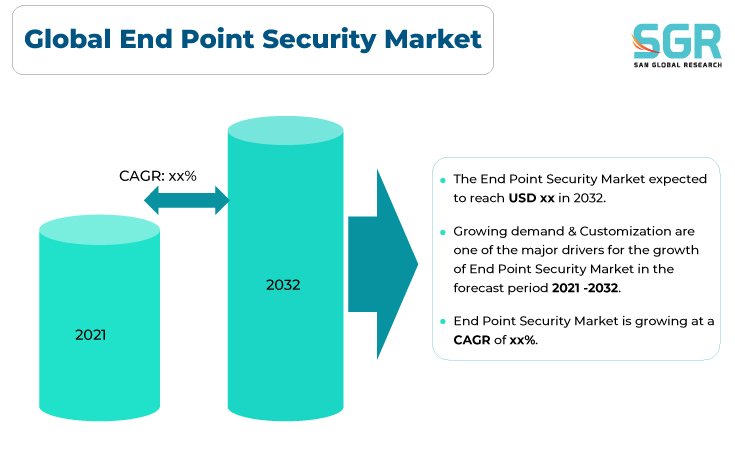
Region Wise Comparison:
North America stands as a significant market for endpoint security solutions, led by the United States, where cyber security concerns are pronounced across industries due to the high frequency of cyber attacks. The region's focus on technological innovation drives the adoption of advanced endpoint security tools and platforms to protect against evolving threats.
Europe showcases a robust market for endpoint security, with countries like the United Kingdom, Germany, and France emphasizing stringent data protection regulations. The region's industries, particularly finance, healthcare, and government sectors, heavily invest in endpoint security solutions to ensure compliance and safeguard sensitive information.

The Asia-Pacific region demonstrates rapid growth potential in the endpoint security market, propelled by increasing digitization and cyber threats. Countries like China, India, Japan, and South Korea witness growing adoption of endpoint security solutions across various industries to fortify defenses against cyber attacks and ensure data privacy and security.
Latin America's endpoint security market is evolving, with countries such as Brazil and Mexico witnessing increased awareness about cyber security threats. Industries, including banking, telecommunications, and government sectors, are investing in endpoint security solutions to mitigate risks and protect against cyber threats.
Africa's endpoint security market is in a nascent stage compared to other continents, with cyber security awareness gradually increasing. Industries in certain regions are beginning to focus on endpoint security solutions to bolster their cyber defenses and protect against data breaches and cyber threats.
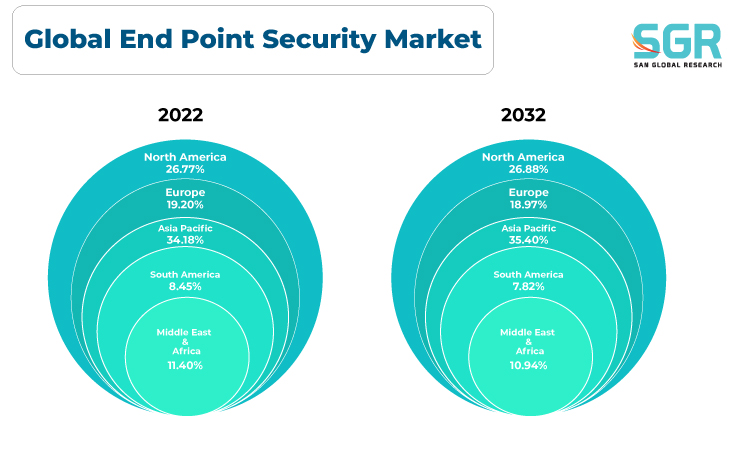
Segmentation:
The Global End Point Security Market is segmented by component, by deployment, by organization, by application and region/country.
By Component:
- Based on the Component, the Global End Point Security Market is bifurcated into Solutions & Services – where the Solution is dominating and ahead in terms of share.
- In the rapidly evolving landscape of endpoint security, various solution types cater to fortifying and safeguarding network endpoints against a myriad of cyber threats. Antivirus and anti-malware software remain foundational in detecting and preventing known threats by scanning and quarantining malicious files or software. Next-generation endpoint protection platforms offer advanced capabilities, utilizing machine learning, behavioral analysis, and AI-driven algorithms to detect and mitigate both known and emerging threats in real-time. Endpoint detection and response (EDR) solutions provide continuous monitoring, analysis, and response capabilities, enabling organizations to detect and respond to sophisticated threats effectively. Furthermore, endpoint encryption tools secure data on endpoints, ensuring sensitive information remains protected even if the device is compromised.
By Deployment:
- Based on the deployment the Global End Point Security Market is bifurcated into On Premise and Cloud – where On Premise is dominating and ahead in terms of share.
By Organization:
- Based on the Organization, the Global End Point Security Market is bifurcated into Large Enterprise and SME – where the Large Enterprise is dominating and ahead of others in terms of share.
By Application:
- Based on the Application, the Global End Point Security Market is bifurcated into IT & Telecom, BFSI, Industrial, Education, Retail, Healthcare, Govt. & Defense and Others – where the IT & Telecom is dominating and ahead of others in terms of share.
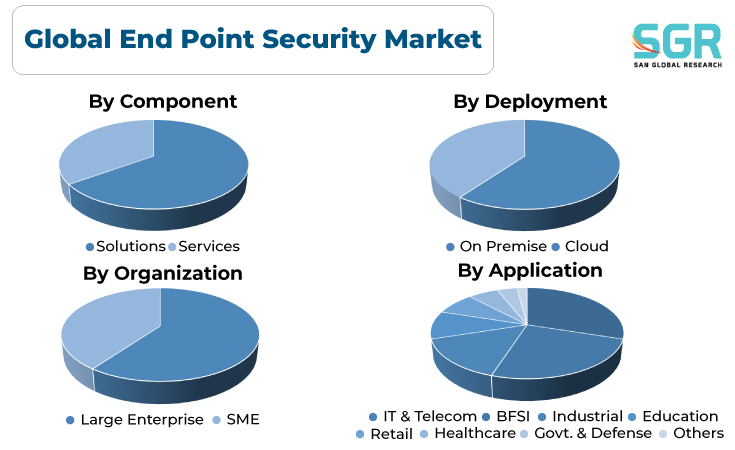
On the basis of region
- North America
- Europe
- Asia Pacific
- South America and
- Middle East and Africa
In 2022, North America is anticipated to dominate the Global End Point Security Market with market revenue of XX USD Million with a registered CAGR of XX%.
Key Players:
The key market players operating in the Global End Point Security Market include
- BROADCOM
- TREND MICRO
- SOPHOS
- MICROSOFT
- KASPERSKY
- PANDA SECURITY
- F SECURE
- IBM
- MCAFEE
- ESET
- CISCO
- BITDEFENDER
Drivers:
Growing sector across the globe
The drivers propelling the endpoint security market are multifaceted, reflecting the evolving nature of cyber security threats and the increasing reliance on digital technologies. One primary driver is the escalating frequency and sophistication of cyber threats targeting endpoints, necessitating robust security measures to protect against malware, ransom ware, phishing attacks, and other malicious activities. The proliferation of remote work and the adoption of mobile devices further amplify endpoint vulnerabilities, driving the need for comprehensive security solutions that extend beyond traditional perimeter defenses. Additionally, stringent regulatory requirements and compliance standards impose obligations on organizations to secure endpoints and safeguard sensitive data, compelling investments in advanced security solutions. The heightened awareness among enterprises about the financial and reputational risks associated with cyber breaches fuels the demand for innovative endpoint security technologies. Moreover, the rapid technological advancements in artificial intelligence (AI), machine learning, and behavioral analytics contribute to the development of more sophisticated security solutions capable of detecting and mitigating emerging threats. As organizations increasingly prioritize safeguarding their digital assets, the drivers shaping the endpoint security market continue to revolve around the imperative need for proactive, adaptable, and comprehensive security measures.
Opportunity:
Evolving Market
The endpoint security market presents a spectrum of compelling opportunities driven by the dynamic landscape of cybersecurity challenges and technological advancements. One significant opportunity lies in the growing demand for integrated and advanced endpoint security solutions tailored to address evolving threats across diverse industries. The increasing adoption of IoT devices and the expansion of remote work environments create opportunities for innovative security solutions capable of securing a wide array of endpoints and networks. Moreover, the rise of cloud-based security solutions and the integration of artificial intelligence (AI) and machine learning algorithms offer opportunities for more proactive threat detection and response capabilities. Additionally, as businesses across sectors increasingly digitize their operations, there's a burgeoning need for user-friendly, scalable, and cost-effective endpoint security solutions that cater to small and medium-sized enterprises (SMEs). Furthermore, regulatory compliance requirements, such as GDPR and other data privacy laws, create a market opportunity for endpoint security vendors to offer solutions that ensure compliance while protecting sensitive data.
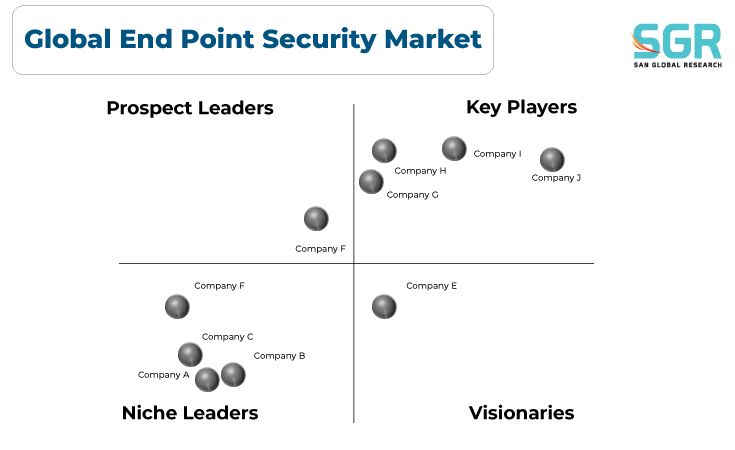

 Description
Description
 Gera Imperium Rise,
Gera Imperium Rise,  +91 9209275355
+91 9209275355


